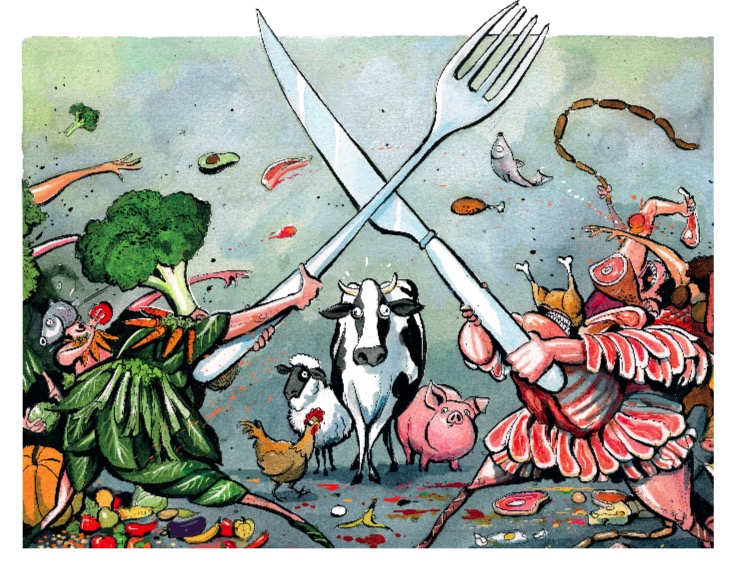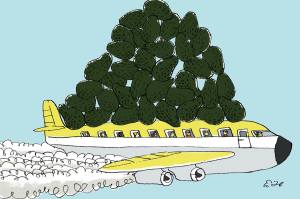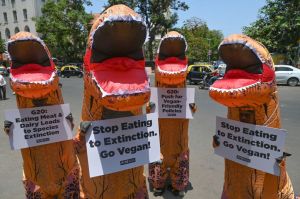This article is in The Spectator’s February 2020 US edition. Subscribe here.
The children are eating eggs and bacon by the time I make it downstairs. A pair of frozen hash browns sits lonely on the plate at the head of the table. They have been cooked in a separate pan, one greased in vegetable oil rather than butter. I scold myself for the bitter glare I cast upon the urchins crying ‘Good morning, Daddy!’ They cannot know that the crisp pork fat and fried eggs lie on their plates only because Daddy has agreed to go vegan for the amusement of Spectator readers. The English never seem to tire of starving the Irish. At least there are potatoes this time around.
Vegans forsake leather in their belts, wool in their coats and any animal product in their mouths. Abstaining from meat is not enough. Eating an egg exploits the reproductive systems of hens, and we cannot have that. In a just world, 23 billion hens would roam the streets side by side with their human brethren. We would have to tread lightly, of course, what with 5.75 trillion eggs littering the ground each year — enough to blanket Denmark. Over the past decade the vegan population has exploded among those with nothing better to do than obsess over what goes into their bodies. In 2012, 2 percent of Americans reported having abstained from consuming products derived from animals. By 2018, that number had skyrocketed to…three percent. This can mean only one thing: our economy is thriving. There are 7.7 billion people walking the Earth right now, more than three billion of them living in poverty. There are accidental vegetarians in every country, but an abundance of food is required to convince people to go vegan. It is a status symbol for people who already enjoy status. Anyone with a bit of luck and ambition can win the rat race. It takes a special kind of hunger to win the rat race and then turn one’s nose up at cheese. ‘Who wanna bet us/ that we don’t touch lettuce/ stack cheddars forever/ live treacherous,’ Jay-Z said in the halcyon days of 1996. By 2019, hip-hop’s first billionaire was allegedly vegan.
You must be wealthy to free yourself of animal exploitation. Not only do the groceries cost more, but the heating bill skyrockets too. For some reason, abstaining from meat and eggs and dairy left me perpetually freezing. I couldn’t throw on long underwear and a coat without contributing to the abuse of sheep. Moral superiority and smugness are a good source of heat, but I found that my best bet was to jack up the thermostat to 80 and worry about the gas bill later.
If the temperature doesn’t convince you to abandon the diet, then the surveillance economy will. It is impossible to resist bragging to others that you are vegan. The problem is that the Blackberry in your pocket (for even the phone must be a fruit) hears every banal boast about your new and ethical veganism. Within 48 hours, Domino’s begins offering half-priced pizzas. McDonald’s is even more desperate: ‘Don’t go bacon our heart,’ the notification says.
Reports of veganism’s growing numbers are misleading. Most people who adopt a vegan diet do so temporarily. It is an effective weight loss tool; as I discovered, it takes only three days to lose all interest in eating. This isn’t to say vegans aren’t interested in food. No one scrutinizes a nutrition label more intensely. The reason goes beyond the purity required of a vegan. You must also make up for the vitamin, protein and iron deficiencies that result from the diet.
Tree nuts are a viable source of plant-based protein, according to the propaganda. The packs of almonds, walnuts and cashews I found tout three to four grams of protein in as little as 15.8 grams of food.You flip the pack over to marvel at what other essential nutrients you are about to ingest in just 100 calories. Then you see it. The allergy information section: ‘Manufactured on shared equipment that also handles other tree nuts, peanuts, wheat, soy and’ — here you swallow hard — ‘milk’.
If you thought you could survive on candy alone, you would be wrong. The gelatin used to make Starbursts and Gummy Bears is derived from animals. Luckily, animal rights lunacy has become big business. Companies spend millions of dollars every year to have their products certified vegan by non-profit groups. Vegan Action of Virginia and the British-based Vegan Society plop logos onto foods so as to reassure consumers of their dietary purity.
Those logos are only good for one year; even if the production of the food or the sweater has not changed, a company must make annual payments to maintain its authorizations. In 2017, Vegan Action generated about 95 percent of its revenue from its certification program, according to its federal filings. The Vegan Society, meanwhile, netted nearly $1.3 million in 2018 — a hefty 28 percent increase from 2017.
Vegan activists aren’t the only ones profiting from the racket. If the nutritional labels are anything to go by, chemists are lining their pockets too. The crunchy set may look down on processed foods, but it turns out it takes a lot of engineering to try to get a carrot to taste like beef, or corn starch to taste like mozzarella.
A plant-based burger is made up of ‘Water, Pea Protein Isolate, Expeller-Pressed Canola Oil, Refined Coconut Oil, Rice Protein, Natural Flavors, Mung Bean Protein, Methyl, cellulose, Potato Starch’ as well as one percent or less of ‘Apple Extract, Salt, Potassium Chloride, Vinegar, Lemon Juice Concentrate, Sunflower Lecithin, Beet Juice Extract, Pomegranate Fruit Powder, Lycopene Color (From Tomato)’.
The ingredient list on a frozen Bubba Burger, linchpin of any Deplorable diet, reads ‘100 percent Angus Beef Chuck’. It has 85 grams of sodium compared with the 390 grams needed to make plants palatable.
My wife is Cuban, Italian and Cajun, making me the first McMorris to marry someone who can cook. She did her level best to make veganism bearable, throwing together every vegetable and oil she could find. She happened upon vegan cheese for a casserole. Threw it in the oven at 400 degrees. It never melted. How could it, with all the phosphates and glycerines and maltodextrin and lecithin and gums and enzymes needed to produce Frankenstein’s muenster?
As some scientist somewhere has deconstructed a piece of meat or cheese and found that it shares some enzyme or gum or phosphate with some plant and determined that this chemical is the essence of the animal, just as his scientist forebears reduced the scent of the forest to Tetramethyl Acetyloctahydronaphthalenes. Vegans are convinced that with enough (human) elbow grease and scientific know-how, they can bend nature to their will. They cannot.
John the Baptist preached repentance eating only locusts and wild honey. He used a leather belt to keep his camel-hair cloak in place. Hair-shirted vegans think John the Baptist should repent for his murderous pillaging of the insect and mammalian population. You will not be surprised to hear that a British man who refuses to ride public transportation because buses can run into bugs has used a religious discrimination law to sue his former employer.
The courts have sided with the disgruntled ethical vegan. They forget that God promised his followers a land of milk and honey, not soy milk and methyl cellulose.
This article is in The Spectator’s February 2020 US edition. Subscribe here.




















